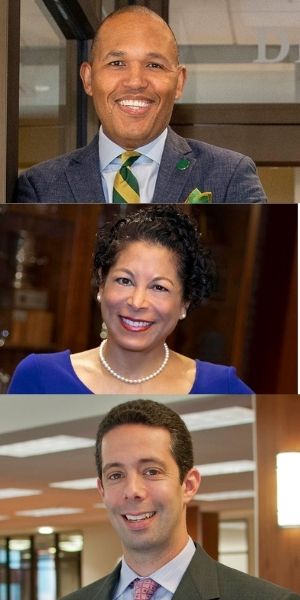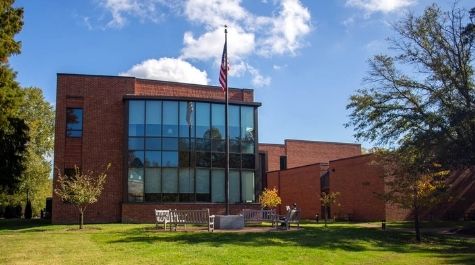William & Mary’s “1L Courses in Context” Encourages New Perspectives on Traditional 1L Subjects
A first-year student at William & Mary Law School described to his classmates the facts of In re K.A., a 1997 opinion from the Illinois Court of Appeals. The defendant, he said, was a juvenile who had been charged with unlawful possession of cocaine that law enforcement had found in an apartment. K.A. had initially fled from the police; he later told the officers that he had only been visiting the apartment to smoke marijuana and listen to music, that he ran because he was afraid, and that he had no knowledge of any narcotics in the apartment.
The student, in setting forth the facts, described the apartment as a “drug house.” Professor Adam Gershowitz, an expert in criminal law and procedure, saw a moment for conversation. “Does anyone want to take issue with any part of the description we just heard?” Gershowitz asked the group of 1Ls. “Does anyone disagree with the characterization of the apartment as a 'drug house'?”
Challenging assumptions is what the Law School’s pilot initiative, 1L Courses in Context, is all about. The initiative, a six-session series of discussions to be held throughout the 2021–2022 academic year, aims to introduce members of the first-year class to new perspectives in each of their doctrinal courses. Each session is tied to a first-year subject; fall 2021 sessions covered Criminal Law, Torts, and Civil Procedure, with Contracts, Constitutional Law, and Property following in the spring.  Dean A. Benjamin Spencer says that the sessions are designed to provide students “with the opportunity to consider the fairness of legal rules and how certain decisions by judges and policymakers can cause or entrench social inequalities across racial, socio-economic, and other groups.”
Dean A. Benjamin Spencer says that the sessions are designed to provide students “with the opportunity to consider the fairness of legal rules and how certain decisions by judges and policymakers can cause or entrench social inequalities across racial, socio-economic, and other groups.”
Professor Vivian Hamilton, founding director of the William & Mary Center for Racial & Social Justice, offered opening remarks at the start of the inaugural session on September 24. The goal of the series, she said, is not to suggest a uniform perspective on the law but rather to encourage students to broaden their own perspectives.
“What this program acknowledges,” she said, “is that as professors, we sometimes are so focused on ensuring that we send you off well-equipped to tackle what comes next that we sometimes don’t always take a minute to focus our attention on both the larger context and the more granular effects of the law.”
Gray Whitsett, a first-year student, said afterward that he appreciated the opportunity to take a different perspective on what he’s been learning in the classroom. “So far, our 1L courses have been so information heavy that it’s been hard to step back and consider the real-world impact of the cases and rules we’ve learned,” he said. “It was especially fulfilling to be able to react to material less out of academic survival and ask the question, ‘Does this ruling make for a better society and, if not, do we need to rethink how the judicial system is working for some but not all?’”
*******************
In the Criminal Law session, Gershowitz turned the students’ attention to a second case, the U.S. Supreme Court’s 1996 opinion in Whren v. United States, in which two defendants charged with violating federal drug laws unsuccessfully challenged the vehicle stop that led to the discovery of the drugs. The defendants had contended that because total compliance with traffic regulations is impossible, law enforcement can easily use technical violations to justify a stop and then investigate incidents for which the officers have no probable cause.
“How many of you,” Gershowitz asked the group, “have technically failed to comply with a traffic regulation?” The hands went up; several students admitted driving a few miles over the speed limit or failing to come to a complete stop at a stop sign, among other infractions. Gershowitz then asked the students to think about who might get pulled over in these circumstances and who might not, or why many residents of his own affluent neighborhood may not fear police investigation even though they had equal opportunities to engage in unlawful drug use. “The homes in my neighborhood have large yards, they’re set back from the street, they enjoy privacy,” he said. “What happens in those houses is not as easily observable as something happening in a ground-floor apartment in a lower-income area,” he noted, referring to the setting of the In re K.A. case.
First-year student Sarah Knott later reflected on the discussion. “It was interesting to see how the concepts we’re learning in Criminal Law actually play out in our legal system,” she said. “I enjoyed diving deeper into the social and economic considerations involved in the law, and I’m looking forward to the next session," she said.
Hamilton ended her remarks at the session with a challenge for the students in attendance. “It is ultimately our hope that the ideas you encounter here don’t remain discrete specific lessons, but instead, that you’ll take them with you when you return to your classrooms, when you enter practice, when you enter public life and exert influence on the law’s continued development,” she said. “We hope this program inspires you not simply to accept what you learn as a given but instead subject it to critique.”
A student attendee said afterward that the sessions could serve as a springboard for further discussion: “It was comforting to consider together how the black-letter law we spend so much of our days learning perpetuates systemic injustices. 1L Courses in Context encourages me to continue these vital conversations with the Law School community.”
About William & Mary Law School
Thomas Jefferson founded William & Mary Law School in 1779 to train leaders for the new nation. Now in its third century, America’s first law school continues its historic mission of educating citizen lawyers who are prepared both to lead and to serve.
